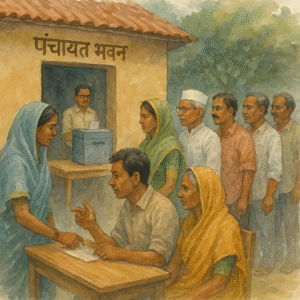Simplified Explanation of the Judgment
The Patna High Court recently dealt with a dispute between a sand mining company (petitioner) and the Bihar Government regarding the extension of its mining lease in Jamui and Lakhisarai districts.
The petitioner had secured a sand mining lease for the years 2016–2019 by offering the highest bid of around ₹49 crore. After the auction, certain formalities were necessary before actual mining could start, such as:
- Payment of 50% of the settlement amount,
- Approval of the Mining Plan by the Department of Mines,
- Obtaining Environmental Clearance (EC) from the State Environment Impact Assessment Authority.
The petitioner claimed that delays by the authorities in approving the Mining Plan (which was issued only in June 2017, nearly 7 months late) left very little time for actual mining. By the time the final work order was issued in November 2019, the lease was about to expire on 31 December 2019. As a result, the petitioner could mine only for about 60 days despite having deposited large sums of money.
The company requested that its lease be extended for three years from the date of the work order. The State rejected this request on 31.10.2019. Later, by a policy letter dated 27.12.2019, the Government allowed existing leaseholders to continue temporarily until fresh auctions could be completed, but only if they accepted an increase of 50% in the settlement amount.
The petitioner challenged both decisions in this writ petition, arguing:
- That the delay was due to the authorities’ inefficiency, not its own.
- That enhancement of 50% was arbitrary, without legal basis.
- That it should be allowed three years of mining from the date of actual commencement (i.e., work order).
The State and Mines Department opposed the claim, arguing:
- In an earlier case (CWJC No. 5429 of 2019), the same petitioner had already sought similar relief. The Court at that time had clearly held the company responsible for delays due to its “careless approach” (such as late submission of documents and clarifications).
- The petitioner did not appeal against that decision and even removed adverse findings while annexing the judgment in the present case—amounting to suppression of facts.
- Having accepted the work order of November 2019 and mined for the remaining 60 days, the petitioner could not later demand extension (principle of “estoppel by election”).
- The 27.12.2019 letter was a general policy option, not a mandatory extension. The petitioner was free to accept or reject it; hence, it cannot claim to be aggrieved.
The Court agreed with the State. It held that:
- The petitioner cannot file a second writ petition for the same relief already denied in the earlier case.
- The delay was attributable to the petitioner itself, as already recorded in CWJC No. 5429 of 2019.
- By accepting the 04.11.2019 work order and operating under it, the petitioner had waived its right to challenge the rejection of extension.
- The 27.12.2019 policy decision was merely an option for all leaseholders during a transitional period and not an extension of the petitioner’s original lease.
Accordingly, the Court dismissed the petition.
Significance or Implication of the Judgment
- For mining companies: The decision clarifies that lease periods are counted from the date of allotment, not the date of work order. Delays in obtaining clearance or completing formalities do not automatically entitle companies to extension.
- For the government: The judgment strengthens the State’s authority to regulate mining leases and implement uniform policy decisions. It also discourages attempts to misuse litigation by suppressing facts.
- For the public: The ruling ensures transparent and time-bound mining operations, preventing unfair extension of leases without fresh auctions, thereby protecting revenue and natural resources.
Legal Issue(s) Decided and Court’s Reasoning
- Can the petitioner seek extension of lease for three years from the date of the work order?
❌ No. The Court held that the earlier decision (CWJC No. 5429 of 2019) already attributed delay to the petitioner. The lease was valid only for the fixed period (2016–2019). - Was the 27.12.2019 Government letter arbitrary?
❌ No. It was a general policy decision offering an option to all lessees. Since the petitioner did not accept it, there was no cause of grievance. - Can a second writ petition be filed for the same relief already decided?
❌ No. The petition was barred by principles of estoppel and waiver. - Did the petitioner suppress material facts?
✅ Yes. By removing adverse findings from earlier judgment annexures, the petitioner misrepresented facts.
Judgments Referred by Parties
- All India Groundnut Syndicate Ltd. v. CIT, Bombay City, AIR 1954 Bom 232
Judgments Relied Upon or Cited by Court
- CWJC No. 5429 of 2019 (Patna High Court, earlier case of same petitioner)
- Mr. Aman Sethi v. State of Bihar & Ors., LPA No. 379 of 2019 (Patna High Court)
- Joint Action Committee of Airline Pilots’ Association of India v. DGCA, (2011) 5 SCC 435
Case Title
Westlink Trading Pvt. Ltd. v. State of Bihar & Ors.
Case Number
Civil Writ Jurisdiction Case No. 2746 of 2020
Citation(s)
2021(2) PLJR 291
Coram and Judge
Hon’ble Mr. Justice Madhuresh Prasad
Names of Advocates
- For the petitioner: Mr. Shashi Anugrah Narain, Sr. Advocate with Mr. Mrigank Mauli, Advocate
- For the State: Mr. Gyan Prakash Ojha (GA VII)
- For the Mines Department: Mr. Brij Bihari Tiwary, Special PP
Link to Judgment
MTUjMjc0NiMyMDIwIzEjTg==-eCSVwphQrvU=
If you found this explanation helpful and wish to stay informed about how legal developments may affect your rights in Bihar, you may consider following Samvida Law Associates for more updates.








